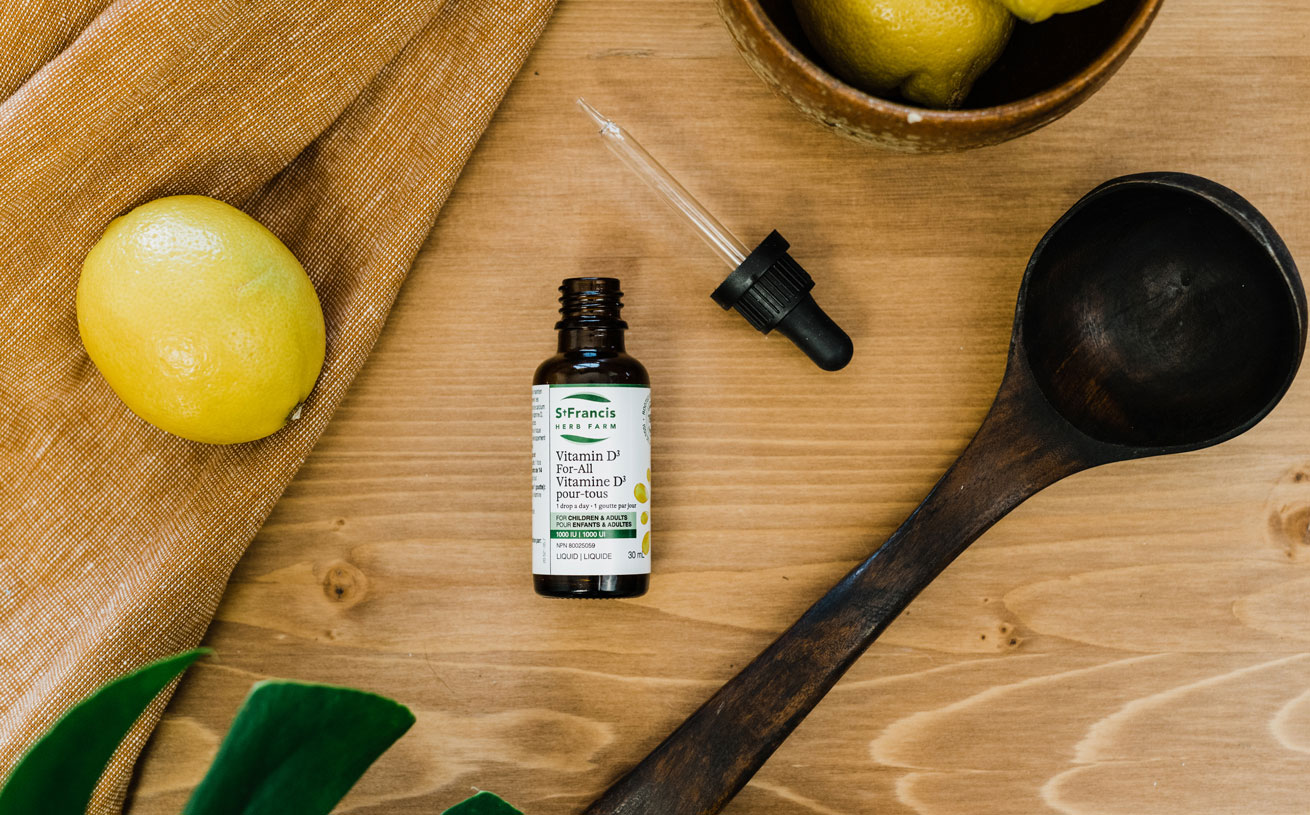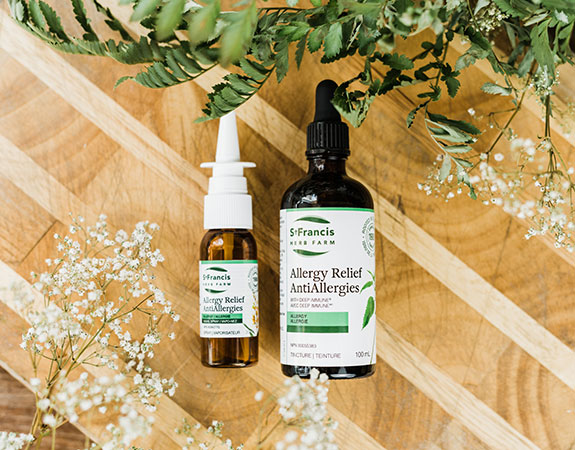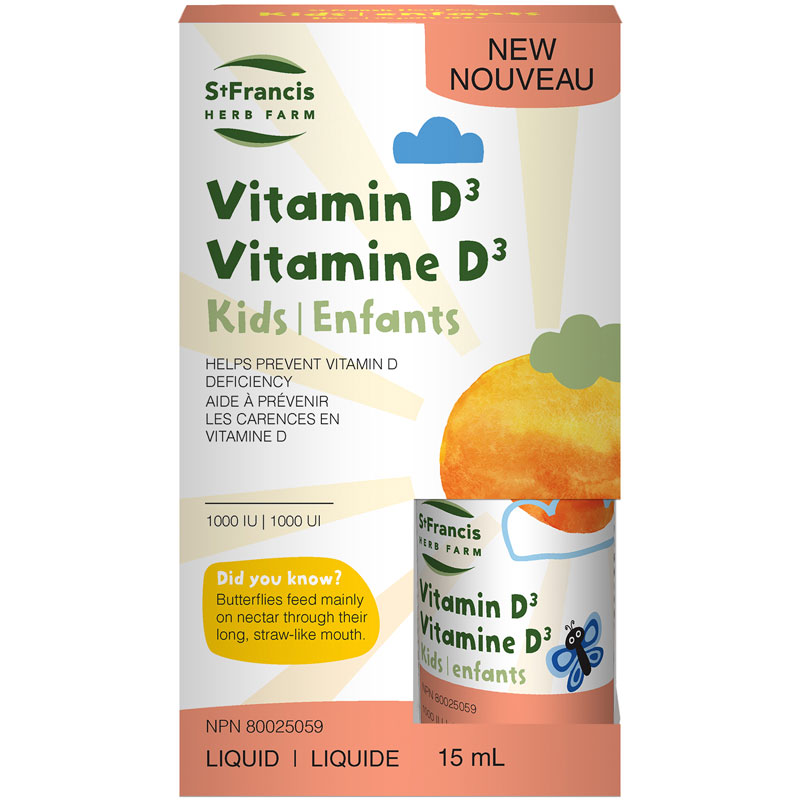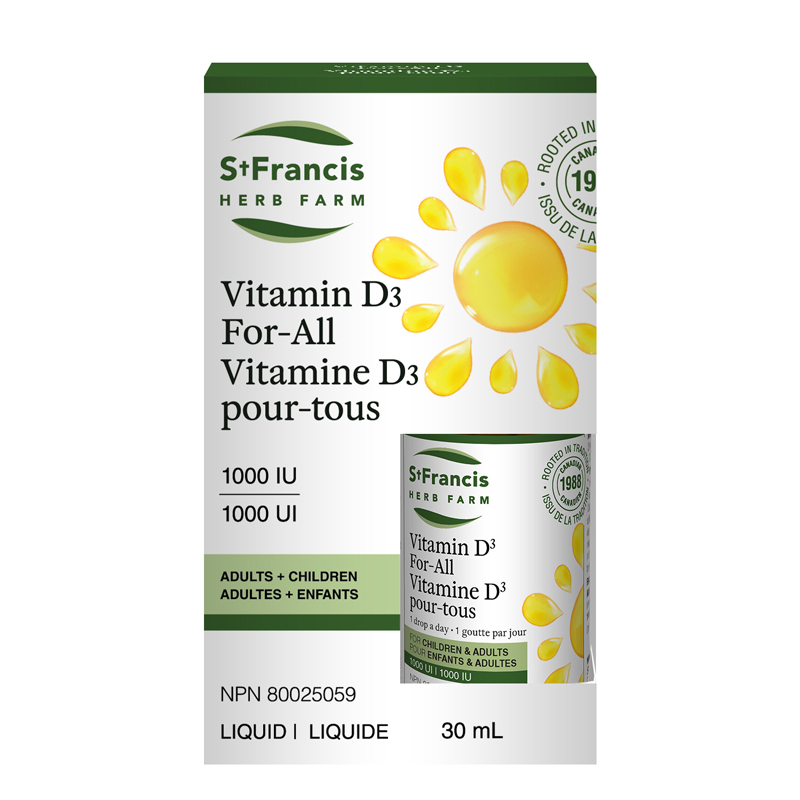Vitamin D has become a well-known supplement that plays many roles in human health – and about one in five Canadians are not getting enough*!
Vitamin D is a fat-soluble substance made up of a group of steroids. It is unique in that it is both a micronutrient we eat and a hormone generated by our bodies. Vitamin D is required for the healthy development and maintenance of bones and teeth, as well as mineral absorption, and is vital in maintaining and supporting the immune system, not to mention many other biological functions in the body.
In fact, we have seen vitamin D receive more attention in the media over the last few years for its association with immune system health. As people seek to optimize their immunity as much as possible, researchers have examined the role of vitamin D in modulating the innate and adaptive immune responses, with promising results!
We get vitamin D three ways:
- sun exposure
- diet
- supplementation
Food sources of vitamin D include fatty fish (salmon, trout, mackerel), sun-exposed mushrooms, beef liver, and egg yolks.
Other foods are fortified with vitamin D, including milk, margarine, plant-based beverages, orange juice, and some yogurts and cheese (often made with vitamin D fortified milk).
Vitamin D is unique in that our bodies can generate it. It is nicknamed “the sunshine vitamin” because, when human skin is exposed to sunlight (UVB ultraviolet light), a compound known as 7-dehydrocholesterol is converted into vitamin D3 in the epidermis (the outermost layer of the skin).
FACT: There are 2 forms of vitamin D: D2 and D3. D3 (cholecalciferol)is the form generated by the skin and is primarily found in animal foods, such as fish, liver, and eggs. It is the most effective and stable for supplementation. D2 (ergocalciferol) is mostly found in mushrooms and fortified foods, like some cereals, as it is less expensive to source.
Why Supplement?
Despite our ability to get vitamin D from both diet and sun exposure, it’s not as easy as it may seem, and some health authorities have described its deficiency as a world-wide epidemic.
A deficiency of vitamin D has been linked to bone health issues, susceptibility to illness, general symptoms like chronic pain and tiredness, a tendency to frequent infections, and depression – and it’s important to get vitamin D every day!
While vitamin D is found in some foods, most diets don’t contain many natural sources, or aren’t eaten in quantities necessary to make them an adequate source.
As for sun exposure, many factors influence getting enough for adequate generation of vitamin D:
- seasonal daylight hours
- time of day
- cloud cover and smog (air pollution)
- sunscreen use
- limited outdoor time
- amount of skin exposed to sunlight
- age (decreased ability to generate vitamin D with age)
- colour of skin (darker skin absorbs fewer UV rays)
Plus, long, dark Canadian winters make the population more susceptible to D deficiency due to a lack of sunlight. Given that winter is the peak of cold & flu season, getting enough is important to support healthy immunity!

Health Canada has recommendations for supplementation among different age groups, but a recent study conducted by researchers in China and Germany has determined the optimal blood level of vitamin D (using a blood test that goes by the name of serum 25 Hydroxy Vitamin D) to be 84.5 nmol/L.
In Canada, blood tests suggest a minimum of 76 as an adequate level (Dynacare, Ontario, reference value), with 250 the upper limit; 25-75 is considered insufficient and <25 is considered a frank deficiency.
Dr. Terry Vanderheyden, ND says, “In my practice as a Naturopathic Doctor, my suggestion to patients is to get a blood test and then to supplement accordingly.
Each 1,000 IU of vitamin D taken per day will raise levels by roughly 25 nmol/L in a few weeks. In the absence of ready access to blood level readings, 2,000 IU per day is my general recommendation for winter months, starting when the clocks fall back, and 1,000 IU per day through the summer, after time springs ahead. ”
Supplementation ensures that you are reaping the valuable health benefits of this essential nutrient – but some vitamin D supplements offer greater quality and absorption than others.
Vitamin D3-for-All offers a simple way to get a daily dose of D – in the most effective D3 form that can be hard to get from dietary sources.
Liquid drops ensure fast absorption and an easy-to-take format that’s suitable for the whole family. PLUS, as vitamin D is a fat-soluble nutrient – its absorption is further enhanced by a base of MCTs from coconut oil along with antioxidant-rich natural rosemary extract for the highest potency and stability.
Vitamin D – just for kids!
Children benefit from Vitamin D3 supplementation too! Our NEW Vitamin D3 Kids helps to prevent deficiency and supports the development and maintenance of bones and teeth.
Vitamin D3-for-All and Vitamin D3 Kids helps to round out a healthy diet to ensure your body is getting what it needs to be healthy – and stay that way!
* According to Health Canada data – source.




